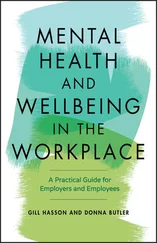Be inclusive in your list of needs and motivations. You may want to revisit the list of secondary needs above as you make your list. When you list your motivations, include the noble ones you discussed on your application. Then, let your guard down to include the less noble needs and resulting motivations. For example, you may like the idea of (a) a nice office rather than a cubicle, (b) prestige and status, (c) being needed, (d) hearing other people’s stories, (e) demonstrating expertise or power in a relationship, and/or (f) saving others from the kind of family you had. Go beyond what you know—speculate about some needs and motivations that you might have even if you are not in touch with them at the moment. Remember Sharon’s story? If she had done this exercise during her training before internship, she might have uncovered the hidden need to understand family dynamics and been less likely to align herself with only one person of the couple.
Part 2 : With your list of needs and motivations in front of you, think about how important each one is or might be. Rate each need and motivation on a scale from 1 to 5, with one being “just a little important,” and 5 being “absolutely critical to my being a therapist.” One way to make these judgments is to ask yourself how you would feel about being a therapist if a particular need or motivation were not satisfied. For example, if “having a big office with nice furniture” is on your list, what would it do to your desire to be a therapist if we told you (just for the sake of argument) that that motivation would definitely not be satisfied during your career?
Like needs and motivations, values can range from noble to base. Schwartz (1994) identified 10 groupings of values:
Power (authority, wealth, social recognition)
Achievement (ambition, competence, success)
Hedonsim (pursuit of pleasure, enjoyment, gratification of desires)
Stimulation (variety, excitement, novelty)
Self-direction (creativity, independence, self-respect)
Universalism (social justice, equality, wisdom, environmental concern)
Benevolence (honesty, helpfulness, loyalty)
Conformity (politeness, obedience, self-discipline/restraint)
Tradition (respect for tradition and the status quo, acceptance of customs)
Security (safety, stability of society).
We can understand values in two ways: values as preferences and values as principles (Parks & Guay, 2009). Values as preferences are personal choices about desirability. They are subjective and can easily change over time. Values as principles are more objective and consistent. We can call them moral values, and they are guides to how people ought to behave (Parks & Guay, 2009, p. 676). Moral values have to do with your relationships to other people: helping them, respecting them, and fulfilling duties.
Some of your moral values are personal and learned from your family of origin, your religious traditions, and other sources. Some of your values are, or will be, purely professional—learned from the socialization process within professional contexts. Some of your values will overlap and be a combination of personal and professional values.
Probably some of your values revolve around the human condition and the desire to see people thrive and grow. Obviously, these values match well with many of the goals of psychotherapy—they also drive, in part, your motivation to be a therapist. Some of your values, however, revolve around financial, social, and personal success and stability. Being a successful psychotherapist is clearly a way to actualize these values. The bottom line is that our values are complex; thus, the likelihood of dealing with conflicting values is high. Indeed, one way to assess and better understand our values is to explore the choices we make when values conflict with other values and/or motives (Abeles, 1980). For example, you might believe that having nice things is a good thing and you value having a nice office in which to work, but your value and motivation to help people without access to mental health care keep you working at the local mental health center for a lower salary than you could earn in private practice.
Journal Entry: Values and Values Conflicts
Similar to the list of needs and motivations you considered around being a therapist, generate a list of your values—both personal and professional. You might use the list identified by Schwartz. After you’ve created your list, rank them based on their importance. Which ones are personally most important? Which ones are personally least important? Now, narrow your focus to professional values: When you think about fulfilling the role of therapist, which values are most important? Make note of the overlap and potential conflicts between (and within!) your lists of personal and professional values.
These lists of needs, motivations and values are part of your core—the foundation of your professional/ethical identity. A good understanding of your core helps you shoot for the ethical ideal (not perfection, by the way)—setting your goals, understanding the tripping points along the way, and choosing excellent behaviors.
However, not all of your needs, motivations, and values as a professional are satisfied at any given time. For example, your value of helping, your motivation of wanting to see them grow, and your need to feel successful will not be fully actualized when you don’t see clients improving, or improving as quickly as you think they could. Staying mindful of your full set of needs, motivations, and values may help ground you during these times of discouragement.
It is important to know the difference between having values and the expression or implementation of those values. Sometimes it will appear that the values you hold conflict with those of the psychotherapy profession. However, the issue may be one of expression rather than the values themselves. For example: We may value compassion, but we cannot show our compassion with clients in the same way we do with friends (hugging, lending money, sharing our problems, etc.). Many of the situations and issues we explore throughout the book, about boundaries, confidentiality, and so forth, will involve how we express our values differently in professional contexts. Many will also involve actual conflicts of values.
Food for Thought: Exploring Personal Needs, Motivations, and Values
A client of yours is working on some anxiety about her local acting job. The client tells you wonderful, funny stories about her life and family. You are fascinated, at times spellbound, by the client’s dramatic way of speaking. She is a pleasure to work with because she is professionally rewarding—she’s making progress in therapy—and personally engaging. Several months later, the client appears on a local news program telling those same stories as part of her one-person show. Within a few months, your now-former client has made it big! You see her now on national talk shows; she even refers to her “shrink” in some of her interviews. You can’t help but feel the urge (as any human being would) to brag to your friends that you’re the “shrink” and that you helped her work through her anxiety to get to where she is today.
Explore your needs, motivations, and values: Why do you want to tell others? What need might telling others meet? To feel powerful, important? To impress your friends? To become, perhaps, a bit of a celebrity yourself? What values come to mind as you explore the urge to share this little bit of information? Keep exploring and speculating until you gain some new insights into your needs, motivations, and values. What might be there? What are the new insights and how do/might they influence your understanding of your core and your professional/ethical identity?
Читать дальше












